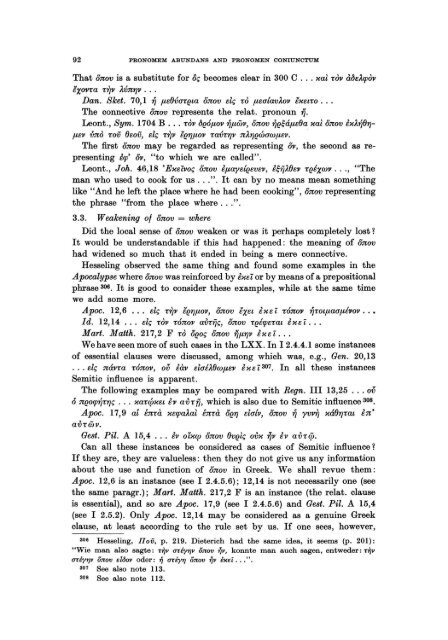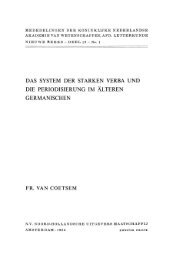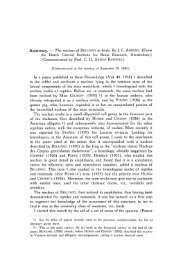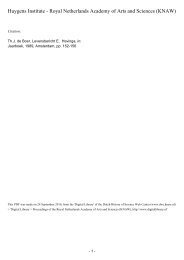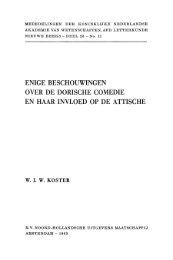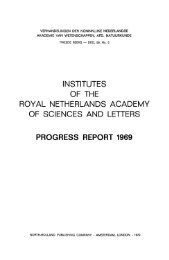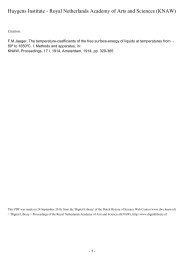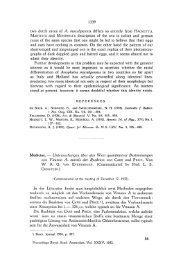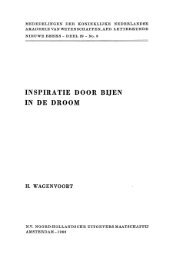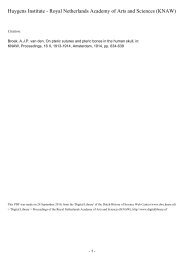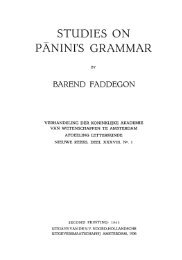Pronomen Abundans and Pronomen Coniunctum. A ... - DWC
Pronomen Abundans and Pronomen Coniunctum. A ... - DWC
Pronomen Abundans and Pronomen Coniunctum. A ... - DWC
Create successful ePaper yourself
Turn your PDF publications into a flip-book with our unique Google optimized e-Paper software.
92 PRONOMEM ABUNDANS AND PRONOMEN CONIUNCTUM<br />
That 8nov is a substitute for 8ç becomes clear in 300 C . .. xai 1'011 àc5eÄ.IPoll<br />
lX01l1'a 1'~1I AVn?]lI ...<br />
Dan. Sket. 70,1 fJ fteOva1'(!ta 8nov elç 1'0 ftea{avAov lxet1'o . ..<br />
The connective 8nov represents the relat. pronoun ij.<br />
Leont., Sym. 1704 B ... 1'0'1' c5(!6ftov fJWÏJv, 8nov fJ(!~áfteOa xai 8nov iXA~O?]<br />
ftev vno 1'OV Oeov, elç 1'~v l(!?]ftov 'l'av1'?]V nA?](!WaWftev.<br />
The fust 8nov may be regarded as representing 8'1', the second as representing<br />
iIP' w, "to which we are called".<br />
Leont., Joh. 46,18 ' Exe'ivoç 8nov iftaye{(!evell, i~ip .. Oev 1'(!Éxwv . . ., "The<br />
man who used to cook for us . ..". It can by no means mean something<br />
like "And he left the place where he had been cooking", 8nov representing<br />
the phrase "from the pI ace where ...".<br />
3.3. Weakening ot 8nov = where<br />
Did the local sense of 8nov weaken or was it perhaps completely lost?<br />
It would be underst<strong>and</strong>able if this had happened : the meaning of 8nov<br />
had widened so much that it ended in being a mere connective.<br />
Hesseling observed the same thing <strong>and</strong> found some examples in the<br />
Apocalyp8e where 8nov was reinforced by èxe'i or by means of a prepositional<br />
phrase 306. It is good to consider these examples, while at the same time<br />
we add some more.<br />
Apoc. 12,6 . . . elç 1'ijv l(!'Yjftov, 8nov lXet ixe i 1'6noll fJ1'otftaaftÉlIov ..•<br />
Id. 12,14 . " elç 1'0'1' 1'6nov av1'ijç, 8nov 1'(!ÉIPe1'at ixei . ..<br />
Mart. Matth. 217,2 F 1'0 O(!OÇ 8nov 17ft?]V ixei . ..<br />
We have seen more of such cases in the LXX. In I 2.4.4.1 some instances<br />
of essential clauses were discussed, among which was, e.g., Gen. 20,13<br />
.. . elç náv'l'a 1'6noll, 0-0 iàv elaüOwftell i x ei 307. In all these instances<br />
Semitic influence is apparent.<br />
The following examples may be compared with Regn. III 13,25 . . . 0-0<br />
Ó n(!o~1'?]ç ... xanpxet ill av1'fj, which is also due to Semitic influence 308.<br />
Apoc. 17,9 at Én1'à xeIPaAai Én1'à O(!?] ela{v, 8nov fJ yvvij xáO?]'l'at in'<br />
av'l'löv.<br />
Ge8t. Pil. A 15,4 ... iv oixep 8nov OV(!iç ovx 1}v iv av1'q>.<br />
Can all these instances be considered as cases of Semitic influence?<br />
If they are, they are valueless: then they do not give us any information<br />
about the use <strong>and</strong> function of 8nov in Greek. We shall revue them:<br />
Apoc. 12,6 is an instance (see I 2.4.5.6); 12,14 is not necessarily one (see<br />
the same paragr.); Mart. Matth. 217,2 F is an instance (the relat. clause<br />
is essential), <strong>and</strong> so are Apoc. 17,9 (see I 2.4.5.6) <strong>and</strong> Ge8t. Pil. A 15,4<br />
(see I 2.5.2). Only Apoc. 12,14 may be considered as a genuine Greek<br />
clause, at least according to the rule set by us. If one soos, however,<br />
306 Hesseling, IIoiJ, p. 219. Dieterich had the same idea, it seems (p. 201):<br />
"Wie man a1so sagte : T1)V aTÉyrJv 8:/tov *" konnte man auch sagen, entweder : T1)v<br />
aTÉy1]V 8nov ÛÓOV oder: 1j aTÉy1] 8nov *' beû . .." .<br />
307 See a.lso note 113.<br />
308 See a.lso note 112.


